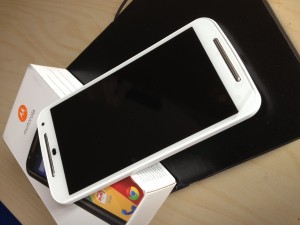It has been an interesting tech year for me.
I’ve had a mobile phone or a smartphone since the mid-90s. But since last September I’ve been doing something quite unusual – owning a smartphone, Motorola’s Moto G, as opposed to effectively renting one from Carphone Warehouse, and it only becoming my property after I’ve paid rather a lot of money for it, two years later, when it’s been superseded by a later model anyway.
Lots of family members have the iPhone 5 and one even has the 6, and it’s likely I would have carried on as a serial iPhone user myself if I hadn’t diverted into this very interesting Motorola experience.
They all have their iPhones on a contract, paying the monthly fee, never owning them until the contract runs out when they upgrade and sell the old phone. It’s a bit like paying the service bill for your car. You wince a bit, but that’s how it’s always been, so you do it because you have to. It’s the same with smartphones under contract; I too, was prepared to carry on paying, without giving the amount it cost me much thought. Now, I’m not so sure I want to go back to that.
I don’t think the idea of paying £300 or more to own an iPhone was even a calculation for most people. I don’t know anyone who’s done that. Even second-hand, they aren’t that cheap. At $179.99 (£116.14), owning a Motorola G actually makes sense, with a likely resale value of a modest something after a year or so, when you would buy the next model up. (indeed, at that price it doesn’t make any sense to take it on a contract.)
Strangely it’s the other way round with cars. Until recently, people have done the opposite, willingly buying them new and often very expensive, and knowing full well that their value will plummet the minute they leave the salesroom. The recent switch to the lease model in car buying comes closer to what we currently do with phones.
What are the advantages of owning a smart phone?
For me it is quite liberating to be in total control of the costs. The phone is mine; I know exactly how much I am spending on it – I have a monthly data contract with EE. And by judicious switching off the data function and using free Wi-Fi whenever I can – it’s surprisingly how much work you will get done for the price of coffee in a coffee shop – I keep well and my limit. I’ve turned what, let’s face it, has always been a small luxury into a very practical everyday device – phone, messenger, small computer, entertainment centre, social media hub, tape recorder, exercise monitor. (Yes, I know every smartphone does this,; it just feels more “mine”.)
As a travel writer, I find this the ideal travel smart phone: cheaper than a camera, but a tape recorder and note-taker too, and not such a disaster if I lost it or had it stolen on a trip somewhere, compared to more expensive smartphones. (It supports a removable micro SD card of up to 32GB, to reduce the risk of losing everything.)
Very roughly, with the price of the phone ( and then changing it after 12-18 months), and not including what I might get back if I sell it on, it costs me about £28 a month, or under a £1 a day all in. And if I only used free Wi-Fi, with a minimum data package, I could do it for a lot less.
What of the practicalities of the phone (a 5-inch 720p HD display, a quad-core 1.2GHz Snapdragon 400 processor, stereo speakers, an 8-megapixel camera, for the techies)?
I have no critical comments. It is slightly bigger than the iPhone, but not awkwardly so, and over the year I’ve scarcely noticed.
I’ve scuffed the glass on the front of it, after one or two minor falls, but otherwise it is unblemished. I like the camera, which is better than the camera on the iPhone 5 I had previously. As a slightly lazy consumer of tech, I explored the functions only so far as I needed to in order to use it for the things I want to do. I’m sure there are shortcuts, and useful features I haven’t discovered. Such as finding and starting the camera faster. I can hardly blame the phone if I’m not doing the research.
I don’t think Android is yet a match for the iOS operating system, but it serves my purposes well enough. Again, if I read more “how-to” tips, I wouldn’t have things such as the same icon twice on my screen.
And the battery? With light to moderate use, it will comfortably last the working day, but might not see me through the night to wake me up in the morning. it was exactly the same on my iPhone. My solution, for the time being, is to always carry a battery pack. Like everybody else, I look forward to the big battery improvements of the future.
The things I haven’t done with this smart phone?
I haven’t used the second Sim card, although it might have been quite useful abroad. (For some time I’ve only used my phone abroad for receiving calls, and making them in an emergency. I only ever use free Wi-Fi for its data services, and this serves me well enough.)
Would I stay with this inexpensive phone? Probably yes. Would I go back to the iPhone? I am honestly not sure.

